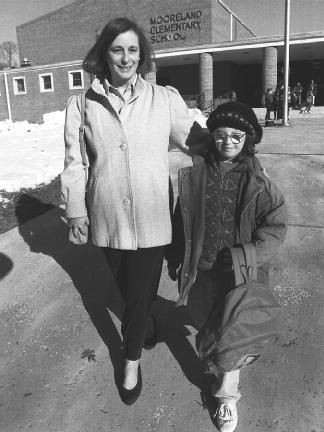Down's Syndrome - Prevention
The only procedure available for preventing Down's syndrome is genetic counseling. In genetic counseling, a trained professional talks with a man and a woman about the chances of their having a Down's syndrome baby. The counselor can inform a couple, for example, that the risk for Down's syndrome increases with the mother's age. Certain tests can also be performed to help with the counseling program.
One of these tests makes use of a protein known as alpha-fetoprotein (AFP, pronounced AL-fuh FEE-toe-PRO-teen). AFP occurs normally in the blood of a pregnant woman. Unusually high or low levels of AFP can, however, suggest problems with the pregnancy. An AFP test can accurately predict the presence of a Down's syndrome baby about 60 percent of the time.

Two other tests are far more accurate. These involve the use of amniocentesis (pronounced AM-nee-oh-sen-TEE-sus) or chorionic villus sampling (CVS, pronounced kore-ee-AH-nik VI-lus). Both are correct about 98 to 99 percent of the time in predicting the presence of a Down's syndrome baby.
In amniocentesis, a long, thin needle is used to remove a sample of amniotic fluid. Amniotic fluid is the liquid that surrounds and protects the baby developing within the pregnant woman. In CVS, a tiny tube is used to remove a small sample of the placenta. The placenta is a spongy tissue that provides nourishment for the growing baby.
In both tests, the samples obtained can be used to make a karyotype of the baby's chromosomes. The karyotype can be studied to see if the chromosomes in position #21 are abnormal. If they are, there is a very strong probability that the baby will be born with Down's syndrome.
A genetic counselor can do no more than provide information to parents about the chance that their baby might be born with Down's syndrome. After that, parents have to make their own decision as to what to do with this information. Some parents decide to have the baby and give it the best possible care. Other parents decide not to continue with the pregnancy.
Once a couple has had one baby with Down's syndrome, they are often concerned about the likelihood of future offspring also being born with the disorder. In most cases, the chances of having a second Down's syndrome child are about the same as having the first. In certain forms of the disorder, however, the chance may increase. For example, if the disorder was caused in the first case by a translocation, the chance of having a second Down's syndrome child is much higher. Genetic counselors are able to calculate with some precision the risk in such cases.

Comment about this article, ask questions, or add new information about this topic: